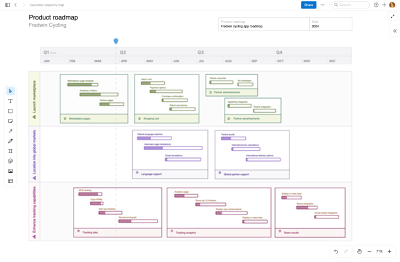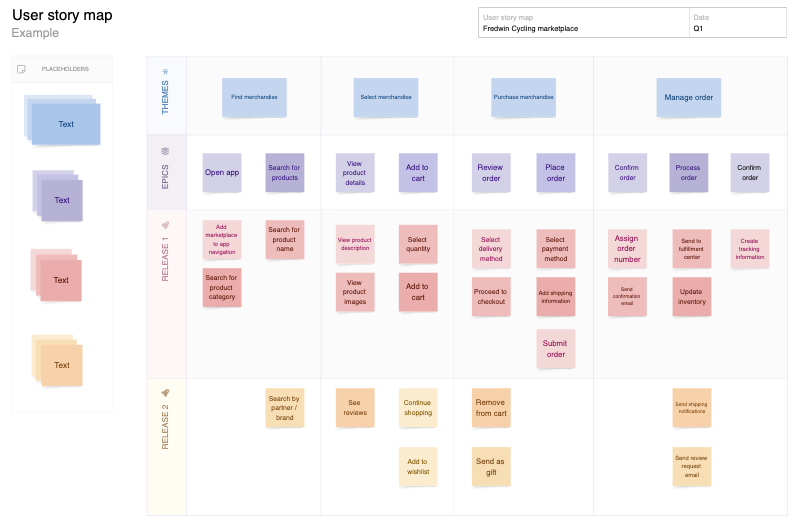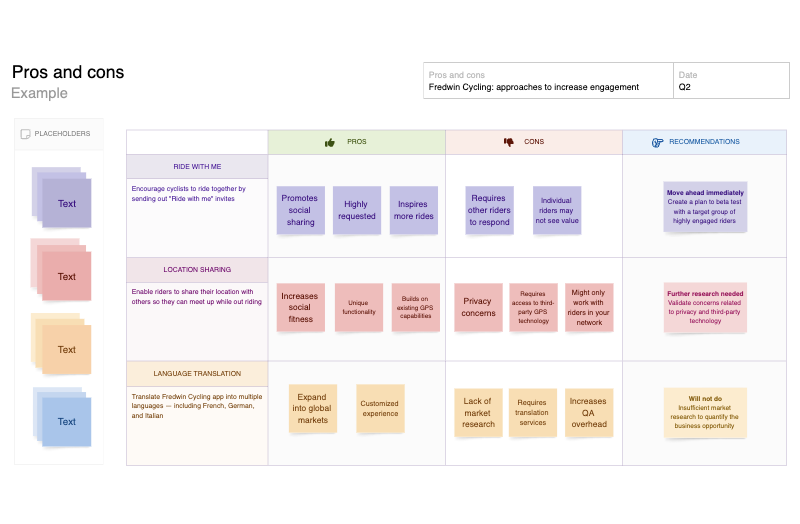SAFe® PI planning templates
Coordinate delivery across multiple agile teams with four program increment (PI) planning templates
Use template
About the SAFe® PI planning templates
PI planning is a multiday event that is scheduled at the start of each program increment. The goal is to bring together everyone in the agile release train (ART) — including agile teams, business stakeholders, and product managers/owners — to review the program backlog and create a plan to deliver the work. With so much to coordinate in a short time period, effective collaboration is key. These whiteboard templates will ensure everyone has access to the same information and can fully participate in the event, no matter whether team members are in the same location or remote.
Included in the PI planning templates
This set of templates includes four boards to facilitate your planning session:
Program board
ROAM board
Sprint planning board
Retrospective board
Customize each template to match your needs, and then share your whiteboard with as many people as you want to streamline collaboration. These templates include the following capabilities to help you succeed:
Use presentation frames to share your PI vision
Import work from Aha! Roadmaps, Jira, and Azure DevOps
Add connectors to highlight cross-team dependencies
Capture feedback and decisions using inline comments
Use the fist to five voting tool to capture confidence votes
Overview of PI planning
PI planning is a collaborative event used by teams that follow the Scaled Agile Framework® (SAFe®). During this process, the entire ART aligns on its work and objectives over a specified period, typically eight to 12 weeks. Teams coordinate efforts, define dependencies, estimate work, and create a plan that ensures progress toward goals.
Start with the program board, filling in your overall PI objectives, milestones, and backlog of features. This sets high-level context — so the team has a clear picture of the functionality they are responsible for implementing. From here, teams can use the sprint planning board to dive into the details of the work. Identify cross-team dependencies, capture risks on the ROAM board, and then hold a confidence vote for the PI. At the end of the meeting, hold a retrospective to gather feedback on what went well with the planning event and what needs to be changed or improved for the next one.
How to use the PI planning template
Use these four program increment (PI) planning templates — program board, team sprint planning, ROAM, and PI retrospective — to coordinate delivery across multiple agile teams. Align on the objectives, deliverables, and milestones that need to be met, so you can effectively work together to achieve success.
Plan your program increment
Define your PI objectives and milestones. Then visualize the features you want to deliver, organize them by team and sprint, and identify dependencies between them.
Organize sprints by team
Use the team sprint planning template to break your features into stories and plan iterations by team. Note any known risks on the right side of the template.
Assess program risks
Assess the risks of your PI with the ROAM board template. Type each risk into sticky notes on the left, then move them into the appropriate quadrant as you gain more insight.
Conduct a planning retrospective
Determine what went well with your planning event and what you will change for next time. The retrospective template helps you improve efficiency for future sessions.
FAQs about the PI planning template
Why is PI planning important?
PI planning is a crucial event for organizations that apply SAFe. It ensures all teams are aligned with the broader business objectives and goals — so teams can focus on implementing functionality that delivers the most customer and business value.
What are some PI planning best practices?
For effective PI planning, align on goals and involve key stakeholders early in the planning process. Break down work by team and sprint and highlight dependencies. Familiarize yourself with techniques such as risk identification (via a ROAM board), confidence voting, user story mapping, and backlog refinement.
Who is this PI planning template for?
This PI planning template is designed for agile teams that follow the SAFe methodology. It can be used by anyone involved in PI planning: scrum masters, product owners, team members, and stakeholders. It serves as a structured framework to facilitate collaboration, alignment, and decision-making during PI planning.
Is this template free to use?
To use this PI planning template, sign up for a free 30-day trial of Aha! Whiteboards. You can also try this template in Aha! Roadmaps if you need a complete product management solution. Easily customize the template to suit your needs, and then share it with as many people as you want (for free) to streamline collaboration.




